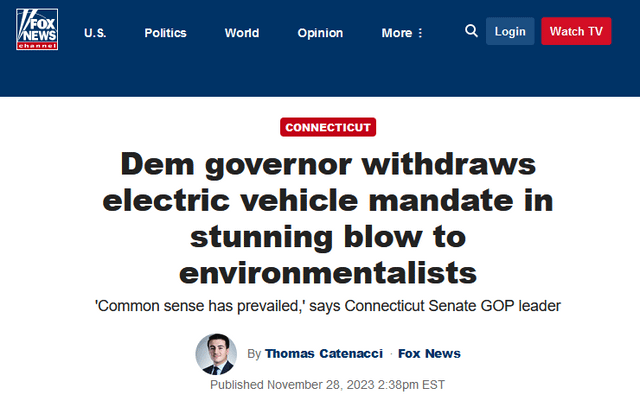Renewed Opposition From Car Dealers To Electric Vehicle Regulations

Table of Contents
Financial Concerns and the Impact on Dealer Profit Margins
The shift to EVs presents significant financial challenges for car dealerships, threatening their traditional revenue streams. The lower maintenance requirements of electric vehicles directly impact service department profitability. Internal combustion engine (ICE) vehicles require far more frequent and complex servicing, generating substantial revenue for dealerships through parts sales and labor. This contrasts sharply with EVs, which have fewer moving parts and simpler maintenance needs.
- Reduced service revenue due to lower maintenance requirements of EVs: EVs generally require less frequent oil changes, brake pad replacements, and other routine maintenance tasks common in ICE vehicles. This translates to significantly reduced service department revenue.
- Higher initial investment costs for EV inventory and specialized training: Dealerships need to invest heavily in acquiring EV inventory, which can be more expensive upfront than comparable gasoline-powered vehicles. Furthermore, they must train their staff on the intricacies of EV technology, including battery maintenance and high-voltage systems.
- Concerns about lower profit margins per vehicle sale compared to gasoline cars: While EV sales are increasing, profit margins on EVs can currently be lower than on traditional vehicles. This is partly due to the higher initial cost of the vehicles and intense competition in the EV market.
- Uncertainty around the future demand for EV parts and servicing: The long-term demand for EV parts and specialized servicing is still uncertain, creating hesitancy among dealers to invest heavily in this area.
Challenges in Adapting to the EV Sales Model
The transition to EVs necessitates a fundamental shift in dealership operations, impacting sales strategies and service models. Dealerships accustomed to the traditional ICE vehicle sales model must adapt to the unique demands of the EV market. This requires substantial investment and a shift in expertise.
- Need for investment in new charging infrastructure and trained technicians: Dealerships need to invest in charging infrastructure to support EV sales and service. They also need to train technicians on the specialized knowledge and skills required for EV repair and maintenance. This represents a considerable capital expenditure.
- Changes in sales strategies to accommodate customer concerns about range anxiety and charging times: Dealers need to address customer concerns about range anxiety and charging times through effective sales strategies and educational initiatives. This requires a change in sales approaches to emphasize the benefits of EVs while acknowledging their limitations.
- Shifting from traditional mechanic-centric services to more software and battery-focused expertise: The focus of service departments will need to evolve from mechanical repairs to software updates, battery diagnostics, and high-voltage system maintenance. This requires acquiring new equipment and retraining existing staff.
- Dealing with different consumer expectations and purchase considerations: EV buyers have different priorities and purchase considerations than traditional car buyers. Dealerships must adapt their sales approach to focus on the environmental benefits, cost savings, and technological advancements associated with EVs.
Government Regulations and Their Perceived Burdens
Stringent government regulations aimed at accelerating EV adoption are a significant source of dealer opposition. These regulations, while intended to benefit the environment, often create substantial burdens for dealerships.
- Mandates for EV sales quotas or targets: Government-mandated sales quotas for EVs pressure dealerships to sell a certain number of electric vehicles, regardless of consumer demand. This can lead to financial losses if the market isn’t ready for the aggressive targets.
- Regulations concerning charging infrastructure requirements: Regulations requiring dealerships to install charging stations are another significant cost burden. This involves significant capital investment and ongoing maintenance.
- Complexity of compliance with various emission standards and incentives programs: Navigating the complex web of emission standards, incentives programs, and regulations adds to the administrative burden on dealerships.
- Concerns about the speed and potential inconsistencies of regulatory changes: The rapid pace of change in EV regulations creates uncertainty and makes it difficult for dealerships to plan for the future.
The Role of Manufacturer Support (or Lack Thereof)
The level of support provided by manufacturers to their dealerships plays a crucial role in determining the success of the EV transition. Insufficient support exacerbates the challenges faced by dealers.
- Insufficient training and education programs for dealers: Many manufacturers are failing to provide adequate training programs to equip dealers with the necessary knowledge and skills to sell and service EVs effectively.
- Inadequate financial incentives to offset the costs of transitioning to EVs: Manufacturers often fail to offer sufficient financial incentives to help dealers offset the high costs associated with transitioning to an EV sales and service model.
- Lack of clear communication and support strategies from manufacturers: A lack of clear communication and strategic support from manufacturers leaves dealerships feeling unsupported and unprepared for the transition.
The Impact of Dealer Resistance on EV Adoption
Dealer resistance to electric vehicle regulations significantly impacts the broader adoption of electric vehicles. This resistance creates a bottleneck in the transition to a more sustainable transportation future.
- Limited EV inventory and availability at dealerships: Dealer reluctance to invest in EV inventory results in limited availability, hindering consumer access to electric vehicles.
- Lack of knowledgeable sales staff capable of addressing consumer questions: Insufficient training leads to a lack of knowledgeable sales staff, making it difficult for consumers to get accurate information about EVs.
- Potential for negative customer experiences, hindering EV adoption: Poorly trained staff and a lack of support can result in negative customer experiences, potentially discouraging future EV purchases.
- Slowdown in the overall transition to a sustainable transportation future: Overall, dealer resistance slows down the crucial transition to a sustainable transportation system, delaying the widespread adoption of EVs.
Conclusion
Renewed opposition from car dealers to electric vehicle regulations presents a significant challenge to the successful transition to a more sustainable transportation system. Addressing the financial concerns, adapting sales models, clarifying and streamlining government regulations, and improving manufacturer support are crucial steps to overcoming this resistance. Ignoring these issues risks hindering the widespread adoption of electric vehicles. For a successful transition, a collaborative approach between policymakers, manufacturers, and dealerships is essential to address concerns surrounding electric vehicle regulations and ensure a smoother path towards a greener future. We urge policymakers to consider these concerns carefully as they continue to develop and implement electric vehicle regulations, promoting a balanced approach that encourages EV adoption without unduly burdening dealerships.

Featured Posts
-
 Confirmed And Predicted Rosters For Spring Breakout 2025
May 18, 2025
Confirmed And Predicted Rosters For Spring Breakout 2025
May 18, 2025 -
 The 2025 Spring Breakout Rosters An In Depth Preview
May 18, 2025
The 2025 Spring Breakout Rosters An In Depth Preview
May 18, 2025 -
 Kanye West Claims Taylor Swift Blocked His Super Bowl Performance
May 18, 2025
Kanye West Claims Taylor Swift Blocked His Super Bowl Performance
May 18, 2025 -
 Sinner Star Miles Catons Desire To Play Spider Man In The Mcu
May 18, 2025
Sinner Star Miles Catons Desire To Play Spider Man In The Mcu
May 18, 2025 -
 Defensie Industrie Nederland Toekomstgericht En Uitgebreid
May 18, 2025
Defensie Industrie Nederland Toekomstgericht En Uitgebreid
May 18, 2025
